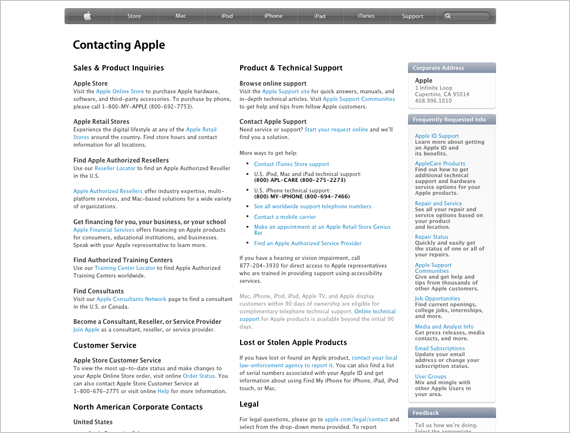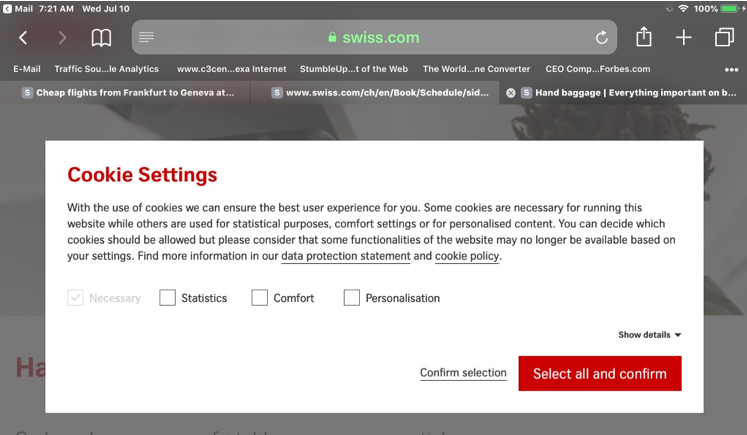I was recently asked to speak about how to build relationships with clients, in this case for a realtor association. In preparing for the interview, I got to thinking about customer privacy and how important it is to build a mutually beneficial relationship to respect customers.
Customers don’t want to be automatically segmented and followed as they go about the web, viewing different sites. An article on Business2Community by Owen Ray says that:
“The tracking cookie is crumbling. Smart cookie-blocking technology led by Apple’s Intelligent Tracking Prevention (ITP) and Firefox’s Enhanced Tracking Protection (ETP) now block third-party cookies by default, and even Google’s Chrome will soon get controls that let consumers block cookies.”
If you want to understand more about the topic of cookies, I highly recommend this two-part article.
Companies that are truly customer centric know that it is important to build a mutually beneficial relationship where there is something for both parties in exchanging information and services. Many businesses ask far too much of their customers, with little if anything in return. I believe this is one of the major reasons customers today are becoming sensitive to what and to whom they give information about their interests, habits, needs and wishes. And why cookies are rapidly becoming a thing of the past.
I, therefore, thought it was useful to review the major points to keep in mind when a business wants to collect information about its customers in order to offer products and services that better meet their wants and desires.
1. Ask Permission to Gather Information
This should be a no-brainer and yet I still find myself on lists to which I didn’t intentionally, if at all, subscribe! You too?
Whether you are connecting with your customers by mail, phone, email or the web, you must first request permission to ask any questions and gather the information you are looking for.
Not only should you ask for their consent if you are not in direct personal contact, but you should also double-check that permission when connecting via email or the web. You have to ensure that the agreement has been given by your customers and that they are still ready to provide the information.
Being attentive to privacy when starting to build a relationship is vital and shows that you respect your customers.
This also means asking them to confirm their consent not once, but twice. Double opt-in, as it is known, ensures that your customer is correctly identified and that they have indeed agreed to provide or receive information or to be put on your mailing list.
Far too often, I see requests where permission is encouraged by using colourful buttons to click, or an implied criticism if you don’t, with phrases such as “No, I have enough sales” or “No, I don’t want to save money”.
2. There Must be Mutual Benefit
When your customer has agreed to provide information, you need to thank them immediately. This can be as simple as offering coupons for your products, some valuable information not easily available elsewhere, a free guide or e-book on a relevant topic, or special privileges such as club membership or express shipping. Something that shows them that they were right to agree and that you value their information.
Another thing to keep in mind is not to overwhelm them by asking too many questions in one go. Since your objective is to build a long-term relationship with them, keep it simple to start with.
You can complete the information you require through several contacts over time, with the same customer. This also has the added advantage of keeping the conversation more frequent than it might otherwise have been. Ask just enough to be able to identify your priority metrics and then refine your understanding of them as you gather more information.
3. Make them Feel Special
More and more CPG companies and brands now offer a loyalty program, especially to their higher-value consumers. These provide more targeted privileges and even give the opportunity to preview new communications or product concepts. In general, customers love to give feedback, and it has the benefit of building a closer tie to the brand as they feel ownership of those launched.
This is probably one of the more intimate and bigger win-win relationships that can be developed with your customer.
But it does take a dedicated team within the company to manage such a club, as these customers are naturally the most demanding for services and constant information updates. So only set one up when you know you can satisfy their needs; otherwise, they can feel frustrated when they perceive they are not getting the attention they think they deserve.
Over the past couple of years, we have started to see new types of member offers. Sephora launched a members-only social platform, which encourages shoppers to share beauty tips and advice, and to comment about any new products bought, not just those from their stores.
Nike has taken things to the extreme by opening an entire members-only store concept, Nike Live, in Los Angeles.
Both of these provide exceptional recognition to their members, making them feel a part of an exclusive program, which is exactly what they are!
4. Keep the Relationship Fresh
Once you start building a relationship with your customers, you must continue to interest them by offering news, information, photos, videos or articles of interest. This can be quite a strain on internal resources, so you may want to consider including user-generated content (UGC) on your website.
Not only does this ensure continuously updated content, but it also involves the customer in what is shown, so that it remains relevant and of interest to them. People love to post and comment, so include message boards, tip-sharing platforms, photo albums, and whatever is relevant to your targeted customers.
Beauty, fashion and pet-care brands were among the first to use UGC, as they are in very visual industries. Who doesn’t want to share a photo of themselves when they are looking especially beautiful, or show how cute their cat or dog is?
One great example comes from L’Oreal. Their DermaBlendPro brand encouraged users to share photos or videos of how the brand had transformed their look, by hiding disfiguration or tattoos. They clearly understood that happy customers make the best brand ambassadors, and this was clearly proven by the thousands of entries and immense buzz the brand received on social media platforms such as Pinterest and Instagram.
5. Ask their Advice – Frequently
For your customers to appreciate how much you value them and their business, involve them in it, by asking for feedback on how you are doing. If you have new ideas or plans, share details with them or enable them to vote for new flavours, concepts or advertising ideas.
You can also enable them to preview the ads or products before everyone else but do make sure you provide them with some great information about it, too, so that they can share it with their friends and family members. This will make them feel like the special and valued customer they are, and also help you spread the word – for free!
6. Always Offer a Simple Way Out
Once you have made the connection with your customers, recognise that they might change their minds at any time and want to unsubscribe from your club or mailing list. Make this as quick, simple and pain-free as possible. This shows respect for your customer and their time and also enables them to leave with a positive opinion of you and the brand. You never know; they might change their minds and stay after all, or come back again in the near future.
From making the unsubscribe link in tiny font to pale and almost illegible to using button colours to mislead, many brands think that this will stop people from unsubscribing. It may, but it is more likely just to irritate them and label your communications as spam.
Even large companies get this wrong. Apple may provide full details of all the different ways to connect on their contact page, but it is laid out in an overwhelming block of text that is so off-putting that I doubt anyone hunts to find the information they need. See below.

Another example used by Swiss Airlines and their parent company, Lufthansa, almost had me agreeing to give all my information, not just the necessary data, to make my experience more comfortable. Their coloured button draws the eye, and without reading, you could end up making the same mistake I almost did.

With so much choice available to customers today, it is our responsibility to build an engaging and respectful relationship with them. If there is no trust, there may soon be no sales!
What other ways do you show respect for your customers? Please share your best examples below. Of course, if you have come across a bad example that frustrated you, then please share it too. Let’s name and shame!












